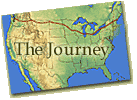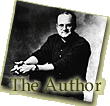 |
 |
 |
 |
||
|
Contact Brian
Newhouse
Copyright 1998 Brian Newhouse. |
||
|
The Book
|
Dad got on the shop extension. He said almost nothing, as usual, asked no questions about how I am, just chuckled in all the right spots to let us know he was still there. I could see him in his baggy blue overalls, the phone crooked in his shoulder, maybe a piece of gutter in one hand, a tin snip in the other. The conversation drew on, and I began to wonder about his silence. After fundamental Christianity, his interest lies primarily in his shop—so unlike any other farm shop you've seen. Besides the usual bench full of wrenches and drills, this is where he slaughtered turkeys for thirty years. "Dressed" them, is the euphemism of the trade. "He's out dressing turkeys," Ma would say when as a boy I asked of Dad's whereabouts. If he wasn't in the field or garden, he was in the shop, dressing. One of my earliest memories of him is of a fall morning when he picked me up; I was probably three or so, and remember his cheek, bristly with beard and tight-red from the cold—a streak of rust-brown turkey blood drying on his neck. I was still a boy when Dad retired from turkey slaughter, so memories of the place are made more fantastic by the way death plays on a child's imagination. Five live birds at a time were hung from their feet in a rack which looked straight out of some Vincent Price movie. The little knife he used was no larger than a good-size kitchen paring knife, but it was the Lord's own Sword of Death, the way Dad slid it into the bird's wrinkled orange neck, spewing blood. And all the machinery that goes with butchery, the rack to dunk the dead bird in scalding water, the rotating vat with its black rubber fingers to rub the bird of its feathers, the steel-neck vacuum sealer that sucked the air from the bird's final home, the plastic bag—all perfectly medieval to me then and now. A large tin trough caught the blood from the turkeys' throat. It had a hole in one end, from which the blood spilled onto the floor. Dad had chiseled a little groove into the concrete, where blood coursed to a hole in the wall, splashing finally into the open pasture. After each days' dressing, he'd throw open the big shop door and hose the whole floor down. I couldn't stand the killing, so this was when I usually showed up. The scent of blood and cold water on concrete is always in the back of my nose, and sometimes just the smell of rain on a sidewalk puts me in his shop again. But the shop was also his studio for creating. Odd, wondrous machines rolled out its door, including a contraption to de-tassel corn that looked inspired by Chitty Chitty Bang Bang. It even worked. And a three-wheeled go-cart made for my brother and me out of steel posts, a third-hand lawn-mower engine, and a tractor seat. It ran fast as hell until one hot afternoon one of its welds snapped and the left wheel shot clean off, pitching me at 30 m.p.h. into a ditch. My survival made me an instant celebrity to my brother. Dad worked out his religion in the shop, too. I could walk in there this very afternoon and find, stashed in the tiny wooden drawers of the screws-and-nails cabinet, a half-dozen breast-pocket notebooks filled with scripture passages in his strong, straight hand. The radio was rusted on WMBI-AM, the Moody Bible Institute station out of Chicago. In the rafters rests a life-size cross made of 2X4's, and around it is wrapped a length of old garden hose, the end of which holds a hand-carved snake's head. I asked him about this once and he quoted a passage from Revelation. That's what life is, he said, the battle between the serpent and the cross. "And we have to choose." The blood has seeped into the concrete, and even though he hasn't slit a turkey's throat for twenty years, if I step in there on muggy Illinois afternoons when that cold concrete sweats, Dad is once again the man who can make things die, the man who builds you a go-cart, and the man whose religion scares the shit out of you. I turn from the shop, and all these things are mixed up together in my head. His slaughtering and his Christianity. His generosity and his hardness. His whole life and our whole relationship are crystallized there in that shop. It's no wonder my feelings for him are so mixed up. Probably no wonder, too, that he says so little on the phone with me and Ma. * |
|
More excerpts from A Crossing: "And so it was: the great adventure starts with a pie in the face." Read more... "I shifted out of third gear for the first time in days. What a concept—no headwind." Read more... "You aren't saved, Brian. God won't allow me to go on getting closer to you if you're not saved." Read more... |
 |
 |
 |
 |
||
|
Contact Brian
Newhouse
Copyright 1998 Brian Newhouse. |
||